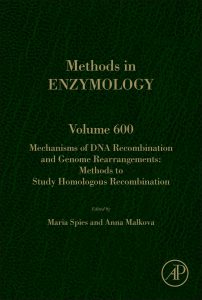Mechanisms of DNA recombination and genome rearrangements : methods to Study Homologous Recombination
CALL NO : W1 ME321 v.600 2018
IMPRINT : Cambridge, Mass. : Elsevier/Academic Press, c2018
Mechanisms of DNA Recombination and Genome Rearrangements: Methods to Study Homologous Recombination, Volume 600, the latest release in the Methods in Enzymology series, continues the legacy of this premier serial with quality chapters authored by leaders in the field.
Homologous genetic recombination remains the most enigmatic process in DNA metabolism. The molecular machines of recombination preserve the integrity of the genetic material in all organisms and generate genetic diversity in evolution. The same molecular machines that support genetic integrity by orchestrating accurate repair of the most deleterious DNA lesions, however, also promote survival of cancerous cells and emergence of radiation and chemotherapy resistance. This two-volume set offers a comprehensive set of cutting edge methods to study various aspects of homologous recombination and cellular processes that utilize the enzymatic machinery of recombination The chapters are written by the leading researches and cover a broad range of topics from the basic molecular mechanisms of recombinational proteins and enzymes to emerging cellular techniques and drug discovery efforts.
Key Features
- Contributions by the leading experts in the field of DNA repair, recombination, replication and genome stability
- Documents cutting edge methods




